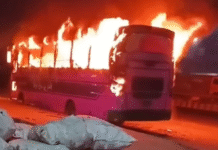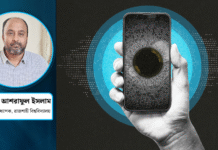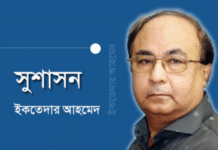Zafar Sobhan
Not only will these debates play a crucial role in determining who our next mayor will be, they can also provide a template for how campaigns are run and our leaders are chosen in the future
It has been a long time since the people of Dhaka have had the chance to vote for their mayor.
The last mayoral election was in 2002, and even then, the AL decided to boycott and not support a candidate, which means that the last time (and the first time, as it happens) we really had a fully competitive mayoral race in the capital was in 1994.
That was over 20 years ago, so the vote for mayor in 11 days time is long overdue, and it is heartening to see that the public is fully engaged and enthused about casting their vote.
Unlike a national election, mayoral elections allow the press and the public to focus their attention on the few constituencies where the races are taking place (three on April 28), which in turn serves to concentrate both the excitement and the scrutiny.
At the national level too much of the voting takes place simply across partisan party lines, with no one paying any attention to the candidates or their manifestos. Typically, the only consideration is the party identity of the candidate, and people cast their vote based on this one criterion.
A mayoral election provides us with a chance to really cast our vote based on the merits of the individual candidate and on what policies he or she might advance if elected to office. To be sure, there will be plenty of voters who will not look beyond the party affiliation (or, to be precise, support, as the election is meant to be a non-party affair) of each candidate, and vote based on that.
But the two Dhaka mayoral races also give us an opportunity to look at the merits, and see who we think would make the best mayor, regardless of party affiliation. It is an opportunity to listen objectively to what each candidate has to say and to make a judgement based on that.
It is for this reason that we at the Dhaka Tribune have teamed up with ATN News and the Institute of Infomatics and Development (IID) to bring the people of Dhaka two televised mayoral candidate debates, one for Dhaka South and one for Dhaka North.
In the upcoming elections nothing is more important that ensuring that the candidates get a chance to make their voices heard and that the voters get a chance to interact with the candidates and size them up for themselves.
The key to a good election is informed participation. Even a fully participatory election is of no use unless the voters have the opportunity to inform themselves about the candidates seeking their vote and are able to make a considered and informed choice.
There is no better forum for communicating this information than a debate between the candidates, that is broadcast on television to the voting public.
We have seen in other countries (the presidential debates in the US come to mind) that the election debates are a crucial component of the election landscape, and that it is unthinkable to hold an election without the candidates braving both one another as well as the television audience, so that the voters can take a long, hard look at them and determine for themselves how the candidates stack up against one another.
With this debate, we hope that we not only will provide a needed service for the voters in the upcoming Dhaka city corporation elections, but that we can kick-start a culture of televised debates in which future candidates will have no option but to face off against one another and will have to make their case to the public in order to be elected.
Regular pre-election debates would transform the political landscape of the country by ensuring that candidates seeking our votes have to come into the spotlight and would be forced to justify to the voters why they deserve our vote.
With hundreds of thousands if not millions of voters tuning in, there is nowhere to hide. Nothing will expose a weak candidate or a showcase the merits of a strong one better than an hour and a half in open debate in front of a closely watching electorate.
It is under the glare of the studio spotlight that we will learn who has the right stuff and who is fit to lead this city. At the end of ninety minutes even the most adept politician is stripped bare of pretence and posturing and left clothed in nothing more than his or her fitness for office.
We hope you will all join us for our historic Meet Dhaka debates, which will be broadcast on ATN News from 9-11pm, on April 21 for Dhaka South and April 23 for Dhaka North.
It will remain your best chance to learn what each candidate stands for and what each candidate is made of. We shouldn’t assume that we already know who will make the best mayor until and unless we see what they have to say for themselves and how they cope with the pressure of facing the voters without intermediaries.
It promises to be must-see television and I can think of no better way to spend two hours in the run-up to the elections. Not only will these debates play a crucial role in determining who our next mayor will be, they can also provide a template for how campaigns are run and our leaders are chosen in the future.
Don’t miss it. You’ll want to be there the night that Bangladeshi politics comes of age.
Source: Dhaka Tribune










